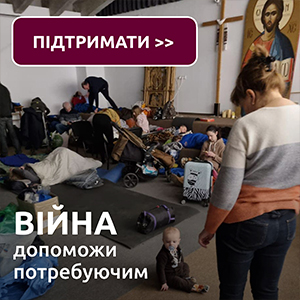Responsibility and credibility in the Church Statement at the end of the meeting of media officers and spokespersons of the Bishops’ Conferences of Europe
Thursday, 19 July 2012, 12:04 The Church has nothing to hide, even with regard to management of its finances! Current society, focused on a culture of consumerism, has raised the criterion of transparency, including financial, to a principle of credibility. Conscious of this new challenge, the Church understands that the new evangelisation is also getting through the communication of credible management of money. Numerous initiatives are already underway so that the vocation to holiness of every Christian also gets through this responsibility.
The Church has nothing to hide, even with regard to management of its finances! Current society, focused on a culture of consumerism, has raised the criterion of transparency, including financial, to a principle of credibility. Conscious of this new challenge, the Church understands that the new evangelisation is also getting through the communication of credible management of money. Numerous initiatives are already underway so that the vocation to holiness of every Christian also gets through this responsibility.
In Cologne, from 11-14 July 2012, the spokespersons of Europe’s Bishops’ Conferences met to examine ways of communicating about the Church’s finances. After taking into account the various financial systems of the Church in Europe, and hearing about the experiences of the French and Polish Bishops’ Conferences in communicating financial results, the spokespersons listened to Roger Molitor, a member of Luxembourg’s State Council and former partner of KPMG-Luxembourg.
The commitment to transparent communication about the Church’s finances is a duty which touches all ecclesial institutions: from parishes, to Catholic associations and movements, and to schools. The Church has nothing to hide, even with regard to management of its finances! What at times might seem opaque or barely transparent, can in fact be traced back to the difficulties of communicating the finances of a multitude of institutional structures and entities which constitute the Church. De facto there is not one Church economic balance: there are thousands and thousands of financial results of parishes, dioceses, schools, hospitals, hospices which in their totality constitute the Church’s financial picture. For some time all these entities have already been committed, with more or less successful results, to the attempt to communicate the fruit of their economic exercise in a transparent way. This communication must not be understood as a response to a growing request for information from journalists, institutions or simply from public opinion. In reality it is inherent in the dimension of the communal management of the Church. In fact for some time many church bodies and Bishops’ Conferences have got into the habit of sharing information about the ways of using the gifts of their own faithful through news conferences, publication of financial results, etc.
Today, however, public opinion seems to be more conscious of transparent presentation of the management of the goods of States, businesses, associations, and of the Church, too. The current socio-economic culture has raised the criterion of transparency to a principle of credibility. Transparency has in fact become an issue of responsibility and credibility, for the Church, too. Therefore all church bodies, and the Bishops’ Conferences primarily, must equip themselves to present in the best way possible their own situation and their mission: a presentation which also includes an economic dimension.
If the Church recognises that it still has a lot to do in this regard, many of the current preconceptions are often also the fruit of misinformation which unfortunately runs the risk of altering the perception, even in the ecclesial culture, of the relationship the Church has with money. The Church is not a society for profit; and money is just a means for realising its mission of proclaiming Christ in history, making the Church also a material neighbour especially to the most needy and the poor. In this sense, the just yearning for greater transparency must not however run counter to the gratuitousness of the gift. In this case, the true thermometer of the Church’s credibility will be the testimonies of charity undertaken.
On various occasions, the spokespersons wanted to express their appreciation and esteem for the policy of transparency, also in the finances of the Holy See, supported by the Holy Father, and, expressing regret at the suffering which a journalism which pays little respect to laws has brought to the Holy Father, they re-affirmed, as communicators, their total loyalty to the successor of Peter.
A large part of the meeting was then devoted to awareness of the Catholic Church in Germany and the means of communication operated there, with contributions from the spokesperson of the German Bishops’ Conference, Matthias Kopp; the editor-in-chief of the Catholic press agency (KNA), Ludwig Ring-Eifel; the testimony of the Auxiliary Bishop of Cologne, Mgr Heiner Koch, focused on care for German Catholic comunities dispersed throughout the world; and there was a visit about Katholische Medienhaus. The German Church is particularly attentive to the world of communication as testified by the work of numerous church bodies working in this field. Faced with the on-going changes in German and world publishing, there was a presentation about the plan for the internal re-structuring of the various media, launched and managed by Katholische Medienhaus, aimed at a greater synergy and development of the work of the many and varied Catholic media.
Participants were also able to visit the radio studios of Deutsche Welle, the institution which promotes German culture and information across the five continents. On the evening of Wednesday 11 July, the spokespersons met the directors of Pax-Bank, the financial institute which aims to promote ethical financing.
Moving to Bonn, on Friday 13 July, and to the main offices of the German Bishops’ Conference, the spokespersons met the General Secretary, Fr Hans Langendörfer, with whom they discussed the positive effects of the official visit to Germany undertaken by Pope Benedict XVI in September 2011 and the Catholic Church in Germany.
The meeting also received reports from the individual Bishops’ Conferences, from CCEE, ComECE, and about the work of the European Agency SirEuropa (www.sireuropa.eu).
Also taking part in the meeting was Dr Angelo Scelzo, Under-secretary of the Pontifical Council for Social Communications, who informed participants about the work of the Pontifical Council.
The 2013 meeting will take place in Bucharest from 12-15 June 2013 at the invitation of the Archbishop of Bucharest, Mgr Ioan Robu.
Thierry Bonaventura
LATEST NEWS

We can imagine what the prayer of the prisoners in the Russian torture centers in the Ukrainian Kharkiv region was like – Head of the UGCC on the 206th day of the war 17 September
A vast cemetery, a mass burial, was found near the city of Izyum, in which more than 400 innocently killed and tortured people have already been...
-
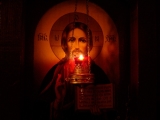 Глава УГКЦ у 158-й день війни: «Нехай Господь прийме з уст нашої Церкви псалми та моління за всіх тих, які особливо просять нашої молитви»
Глава УГКЦ у 158-й день війни: «Нехай Господь прийме з уст нашої Церкви псалми та моління за всіх тих, які особливо просять нашої молитви»
-
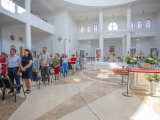 «Сила, яка походить із вірності Христові, є стержнем, який ніхто не може зламати», – Блаженніший Святослав
«Сила, яка походить із вірності Христові, є стержнем, який ніхто не може зламати», – Блаженніший Святослав
-
 Глава УГКЦ у 157-й день війни: «В ім’я Боже ми засуджуємо звірства в Оленівці і світ повинен це засудити як особливий вияв дикості й жорстокості»
Глава УГКЦ у 157-й день війни: «В ім’я Боже ми засуджуємо звірства в Оленівці і світ повинен це засудити як особливий вияв дикості й жорстокості»
-
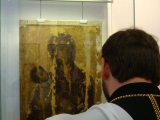 «Боже, почуй наш плач і поспіши нам на допомогу і порятунок!», – Глава УГКЦ у 156-й день війни
«Боже, почуй наш плач і поспіши нам на допомогу і порятунок!», – Глава УГКЦ у 156-й день війни
-
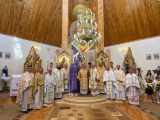 «Бог йому дав серце і душу українського народу»: відбулася щорічна проща до Прилбичів з нагоди уродин митрополита Андрея Шептицького
«Бог йому дав серце і душу українського народу»: відбулася щорічна проща до Прилбичів з нагоди уродин митрополита Андрея Шептицького
-
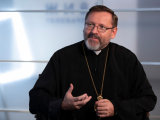 Глава УГКЦ: «Я горджуся українськими патріотами, які без найменшої краплі ненависті готові захищати своє»
Глава УГКЦ: «Я горджуся українськими патріотами, які без найменшої краплі ненависті готові захищати своє»
-
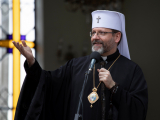 Блаженніший Святослав закликав українську молодь скласти присягу на вірність Христові
Блаженніший Святослав закликав українську молодь скласти присягу на вірність Христові
-
 Глава УГКЦ у 155-й день війни: «Помолімося, щоб не втратити скарбу віри князя Володимира»
Глава УГКЦ у 155-й день війни: «Помолімося, щоб не втратити скарбу віри князя Володимира»
-
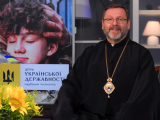 Блаженніший Святослав у День державності України: «Наша Держава – це для нас питання життя або смерті»
Блаженніший Святослав у День державності України: «Наша Держава – це для нас питання життя або смерті»
-
 Глава УГКЦ у 154-й день війни: «Нехай Господь Бог прийме у свої вічні обійми журналістів, які віддали за правду своє життя в Україні»
Глава УГКЦ у 154-й день війни: «Нехай Господь Бог прийме у свої вічні обійми журналістів, які віддали за правду своє життя в Україні»
-
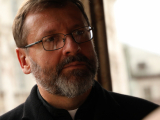 Глава УГКЦ у 153-й день війни: «Принесімо наш біль перед Боже обличчя і будьмо певні, що Він нас вислухає»
Глава УГКЦ у 153-й день війни: «Принесімо наш біль перед Боже обличчя і будьмо певні, що Він нас вислухає»
-
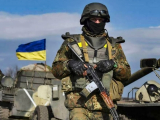 Глава УГКЦ у 152-й день війни: «Помолімся молитву заступництва за наших воїнів»
Глава УГКЦ у 152-й день війни: «Помолімся молитву заступництва за наших воїнів»
-
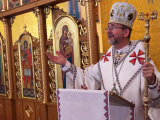 «Віруюча людина не може бути байдужою, коли бачить страждання іншої людини», – владика Богдан Дзюрах
«Віруюча людина не може бути байдужою, коли бачить страждання іншої людини», – владика Богдан Дзюрах
-
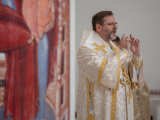 «Серед нашого страждання творімо простір для прояву Божої всемогутності», – Глава УГКЦ у 6-ту неділю після П’ятдесятниці
«Серед нашого страждання творімо простір для прояву Божої всемогутності», – Глава УГКЦ у 6-ту неділю після П’ятдесятниці
-
 Глава УГКЦ у 151-й день війни: «Російське віроломство ми перемагаємо силою любові до нашої Батьківщини»
Глава УГКЦ у 151-й день війни: «Російське віроломство ми перемагаємо силою любові до нашої Батьківщини»

